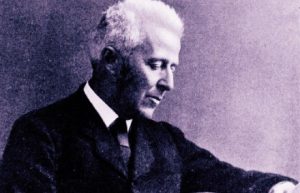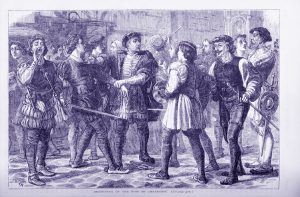
Catherine of Aragon is my spiritual inspiration. Since she’s been dead over four hundred years, we’ve never met, but every once in a while, someone comes along so devout, I can’t help taking notice and for me, that person is Catherine, first wife of Henry VIII, known for his six wives and the infamous rhyme “divorced, beheaded, died, divorced, beheaded, survived!”
She came to England to marry his older brother, Arthur, whose death within six months left her stranded and penniless until Henry VII died. Besotted with a beautiful, redheaded, blue-eyed Spaniard maiden in desperate need of rescue, the young, idealistic Henry VIII married her and they were a passionate couple for many years, before their dead children pulled them apart.
Catherine guided her husband in diplomatic policy, defeated an invading Scottish army, improved England’s gardens, fostered female education (in a time when women were uneducated), founded universities, sponsored bishop scholarships, solicited theological works, used the father of psychology as her child’s tutor, and remained devoted to her faith, holding herself responsible for her actions, her husband’s spiritual welfare and England’s morals. This doomed her to years of disappointment, solitude, punishment, and grief.
Henry wanted an annulment to marry a younger woman and beget sons; his wife’s feminist idea that their daughter, Mary, could lead the country didn’t resonate with him. Catherine came from a matriarchal monarchy, and had perfect confidence their daughter could rule, but Henry wasn’t having it, and Anne Boleyn refused to become the king’s mistress when he asked her. He pursued, harangued, and finally Anne said he wouldn’t sacrifice her virtue for anything less than the throne.
For six years, Catherine defended herself, proving what others, including Anne Boleyn, suspected—she was smarter than her husband. She flouted him on every front, defending her position as queen, her daughter’s right to the succession, and the validity of their marriage. Henry’s advisors suggested it was invalid because of her lack of virginity, but she argued Arthur never touched her. Since she believed lying under confession was a mortal sin, and she swore this to several Church officials. Since Henry never contradicted her under oath (he too believed it would condemn him to eternal punishment), I believe her.

Catherine’s greatest moments came from unimaginable personal anguish: she came into her own when forced to defend herself. She served as her own legal counsel when she realized her lawyers favored her husband and had no desire to win her suit. She out-maneuvered her husband on every front, staying three steps ahead of him for several years, until Thomas Cromwell knew the only way to win would be to invalidate the Pope’s authority and make England Protestant. Henry went from one idea to the next, only to find Catherine had already thought of it, and had prepared a legal counter-attack that limited his influence.
Since he could not beat her by playing fair, Henry divorced Rome, renounced the Catholic Church, annulled his marriage to Catherine, and established a “lite” brand of Protestantism in England so he could marry Anne. Even then, Catherine refused to step aside, recognize her reduced status, or relinquish her rights. She went to her deathbed, still proclaiming herself a queen.
Modern audiences have many opinions on Catherine, which range from admiration to annoyance that she could “not let go.” Those who lack understanding of her religious beliefs cannot understand why she didn’t give up when it became apparent Henry no longer wanted her. They argue she could have entered a nunnery, not realizing Catherine considered it sinful to do so unless called to serve God as a nun; others say she could have protected her daughter had she stepped aside, but Henry never kept his word and I doubt his advisors (and Anne Boleyn’s family) would have agreed to keep Mary in the succession, even behind the Boleyn heirs. They say she lied about consummating her first marriage, when even Henry never denounced her on that front, and held on out of pride though Catherine endured humiliation for standing her ground.
Worse, many of her detractors are women, throwing stones at one of history’s foremost feminists. It was Catherine who believed her daughter could rule England, not Anne (who never got the chance to dream that dream, since her head fell six months after her rival entered the afterlife).
Catherine served as England’s first female ambassador, negotiating terms between her father, Ferdinand of Aragon, and Henry VII, and even attempting to arrange a dynastic marriage after Elizabeth of York died, with her sister, Juana of Castile.
Catherine led an army against the invading Scotts, whose military victory was so successful Scotland took decades to recover after losing a third of its men.
Catherine refused to step aside to fulfill a king’s lust, outsmarting him without legal counsel, and defeated him in the court of public opinion. Her husband created a new religion to get around her traps!
Yes, she was stubborn and proud, she could be temperamental and emotional, and she harbored resentment and a lack of forgiveness against those she considered incompetent (this includes a Spanish ambassador, an unfaithful lady-in-waiting, and Cardinal Wolsey, whom she blamed for Henry’s decision to pursue an annulment, since she could not bear the idea Henry no longer loved her, and saw anger at her husband as disloyal), but these things make her human. She was also intelligent, spirited, independent-minded, and knew how to play the game of politics better than her husband; she ensured her presence at significant moments in his reign and got pardons for 500 prisoners after the May Day Riots.
Her feminism appeals to my spirit, her trials touch my heart, and I’m proud of her accomplishments, but I admire her faith most. England knew her as a gracious, loving queen, wise in politics, intelligent in theology and humanism, and devoted to her beliefs. It might have arisen to defend her, had she called on them, but she refused to raise an army against her husband (she believed that an “immoral” act).

Before her trials, Catherine confessed to her daughter’s tutor, a great Spanish philosopher-humanist (and the father of modern psychology), that she’d rather have sorrows than happiness, because amid sorrow she has no choice but to rely on God, but happier times tempts her to forget his existence. I can’t even fathom having that kind of humility and devotion, or coming from a Catholic background that esteems suffering and personal martyrdom.
When one of her ladies made derogatory comments about Anne Boleyn, Catherine stopped her, urging the lady to pray for her instead, for she feared what might happen if Henry’s wrath fell on Anne (she was right). Even though Henry persecuted her, robbed her of friends, maligned her reputation in a trial, and tried to damage her health by sending her to remote, abandoned castles, Catherine refused to hate her replacement, or resent him for his actions, knowing Anne had no royal blood to protect her from imprisonment or death.
On her deathbed, after enduring years of solitary misery while her husband rejoiced in her ill health, she wrote Henry a letter, offering forgiveness for his transgressions and expressing love. Instead of cursing the man who brought her pain and suffering, she prayed God would forgive him, as she also forgave, in a subtle reference to Christ’s words on the cross (“Forgive them, Father, they know not what they do”). Forever a good Catholic, she offered reconciliation and forgiveness at the end of her life, under her beliefs and despite her hurt pride. She also expressed remorse as she wondered if her actions had harmed England, in allowing Reformist beliefs to take hold.
Christians all throughout history struggle to forgive, abandon hatred, and show no resentment toward their persecutors, and I’m sure Catherine felt no different, but her burning desire for holiness caused her to accept her trials while praying for strength to endure them, finding comfort in God when she had no one and nothing else to hold on to. She was never alone, even in her solitude, and chose each day to align her actions with Christ’s teachings.
Catherine is one of history’s most wronged women, but died in a state of divine forgiveness. She leaves behind a legacy as a strong and intelligent monarch, a powerful woman, a loving mother, and a woman of faith.
Is it any wonder I wound up writing seven novels about her?





